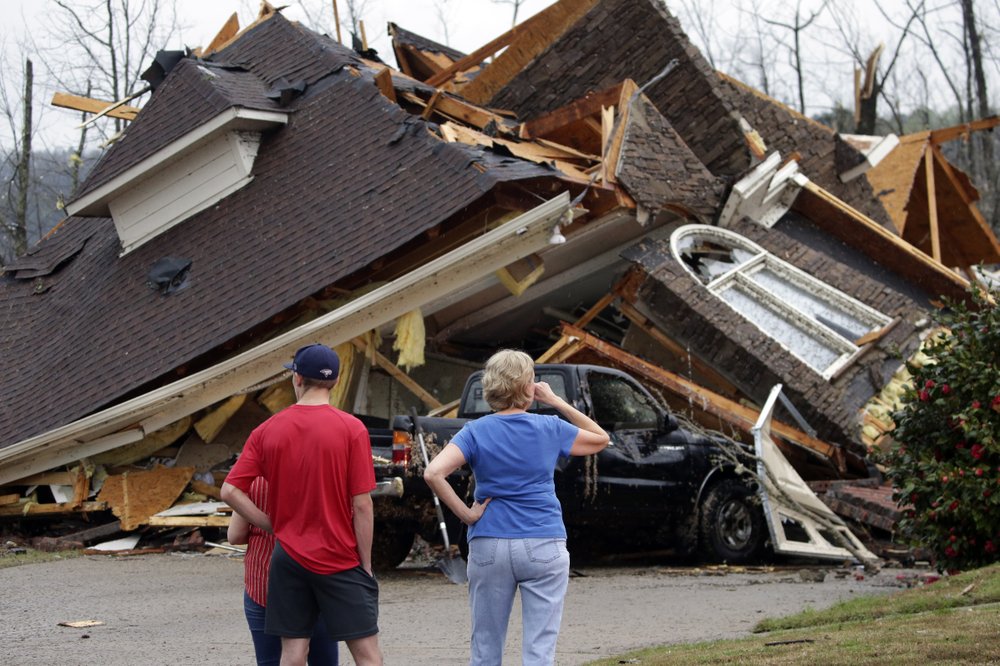
A series of tornadoes hatched by early spring “super cell” storms tore across Alabama and moved into Georgia early Friday, leaving at least five people dead amid ruins of wrecked homes, splintered trees and crumpled businesses.
Authorities said one fierce tornado traveled roughly 100 miles (160 kilometers) across Alabama on Thursday, leaving a long path of damage. The National Weather Service for Atlanta said a “dangerous, fast moving” tornado ripped through some of the metro’s southern suburbs just after midnight.
With power knocked out to tens of thousands and people now tasked with clearing away the debris and rebuilding, the violent weather that swept parts of Alabama and the region marked the most dreaded part of springtime in the Deep South: tornado season.
While Alabama appeared to bear the brunt of Thursday’s tornado outbreak, forecasters warned of dangerous thunderstorms, flash floods and possible twisters from eastern Mississippi into western Georgia, and northward into Tennessee and Kentucky. Also, flash flood warnings and watches extended to the western Carolinas during the night hours.
The deaths were confirmed in Calhoun County, in east Alabama, where one of multiple twisters sprang from a “super cell” of storms that later moved into Georgia, said John De Block, a meteorologist with the National Weather Service in Birmingham.

Calhoun County Sheriff Matthew Wade said the twister cut a diagonal path across the county, striking mostly rural areas — something that likely kept the death toll from being higher.
“Five people lost their lives and for those families, it will never be the same,” Wade said at an evening briefing. “Our hearts, our thoughts and our prayers go to the families, and we are going to do our best to let them know we love them.”
Further west, vast areas of Shelby County near Birmingham — the state’s biggest city — were badly damaged. Civilian drone footage posted on social media showed rooftops cleaved away from stately homes, the winds destroying some while leaving others untouched.
In the city of Pelham, James Dunaway said he initially ignored the tornado warning when it came over his phone. But then he heard the twister approaching, left the upstairs bedroom where he had been watching television and entered a hallway — just before the storm blew off the roof and sides of his house. His bedroom was left fully exposed.
“I’m very lucky to be alive,” Dunaway, 75, told Al.com.
Pelham authorities posted video of large trees blocking roads and utility poles leaning menacingly over debris-littered streets. Firefighters outside a flattened home in the Eagle Point subdivision, also in Shelby County, said the family that lived there made it out alive. Nearby homes were roofless or missing their second stories.
In the western city of Centreville, south of Tuscaloosa, Cindy Smitherman and her family and neighbors huddled in their underground storm pit as a twister passed over their home.
A tree fell on the shelter door, trapping the eight inside for about 20 minutes until someone came with a chain saw to help free them, said Smitherman, 62. The twister downed trees, overturned cars and destroyed a workshop on the property.
“I’m just glad we’re alive,” she said. “Praise the Lord.”
Centreville Mayor Mike Oakley told ABC 33/40 news that a local airport was hit. “We have airplanes torn apart like toys. We’ve got homes along here that are totally destroyed, trees down, power lines down. It’s pretty devastating.”
As many as eight tornadoes might have hit Alabama on Thursday, De Block said. He said investigation teams will review eight suspected tornado tracks, and the final twister number will depend on if any of those tracks can be connected.
First lady Jill Biden postponed a trip to Birmingham and Jasper, Alabama, that she had planned for Friday because of the severe weather, her office said in a news release.
“Thinking of everyone in Alabama and all of those impacted by the severe weather across the South tonight. My prayers are with the grieving families. Please stay safe,” Biden wrote on Twitter.
Earlier, Alabama Gov. Kay Ivey issued an emergency declaration for 46 counties, and officials opened shelters in and around Birmingham.
In addition to deaths in Alabama, Mississippi had a storm-related death on Wednesday. Ester Jarrell, 62, died in that state’s Wilkinson County when a large tree toppled over onto her mobile home after heavy rain soaked the ground, an official told AP.